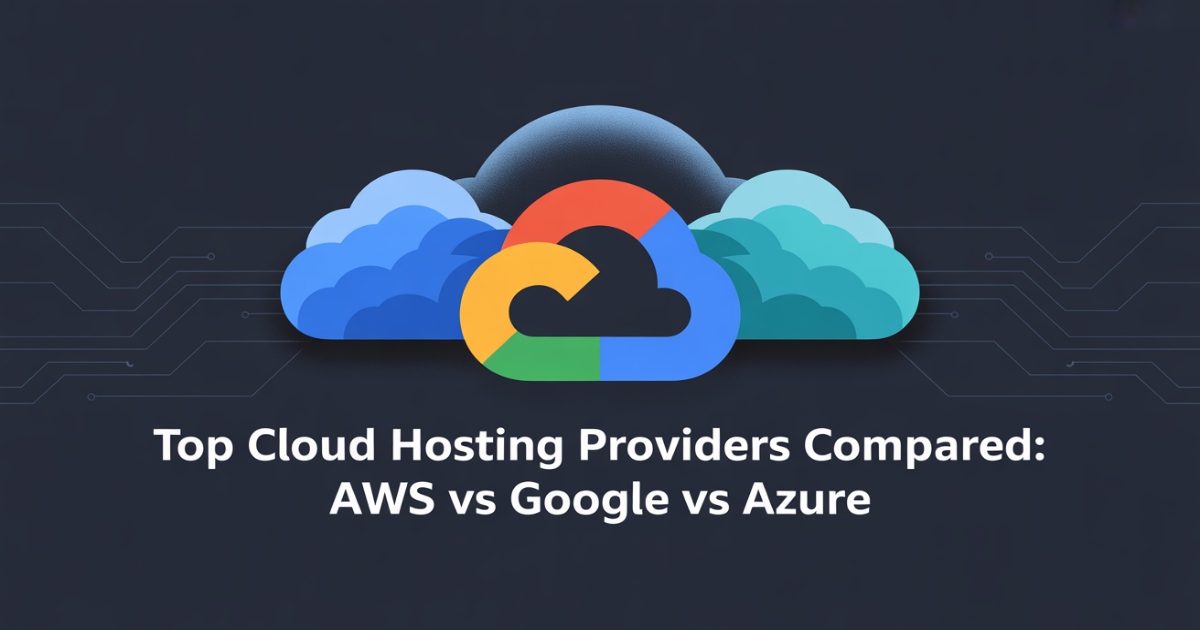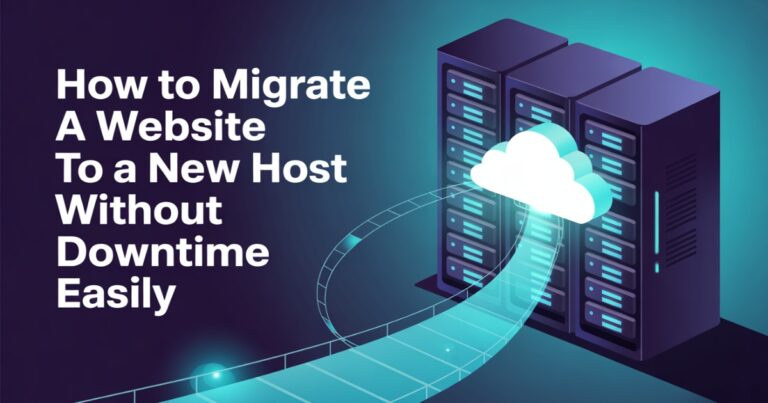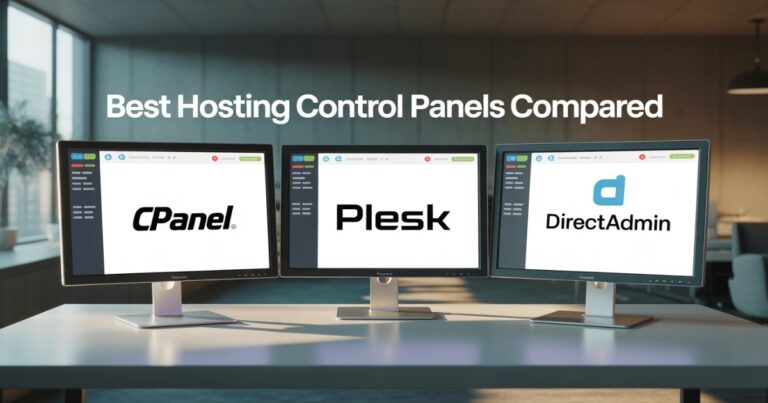Top Cloud Hosting Providers Compared: AWS vs Google vs Azure
When I first moved a project to the cloud, I thought it would be simple. Sign up, move files, and enjoy a faster site. In reality, I had to choose between AWS, Google Cloud, Azure, and others. Each came with different pricing, tools, and learning curves.
That moment taught me a key lesson: the cloud isn’t one-size-fits-all. The right cloud hosting provider can help you grow quickly. The wrong one can drain your budget and cause endless headaches.
Today, cloud hosting powers most apps, websites, and even streaming services. Instead of relying on a single server, it spreads resources across a global network. That means more speed, uptime, and security. In this guide, I’ll break down the top cloud hosting providers in 2025, their pros and cons, and how to pick the right one for your needs.
What to Look for in a Cloud Hosting Provider
Earlier, I touched on why picking the right platform matters. Now, let’s look at the specific features that separate the best cloud hosting providers from the rest:
- Scalability: Your provider should grow with you. Can it handle a sudden spike in traffic?
- Pricing models: Look at pay-as-you-go vs. flat-rate pricing. Some are budget-friendly; others can surprise you with hidden costs.
- Uptime and reliability: Every provider promises 99.9%, but the real-world difference shows during traffic surges.
- Security and compliance: For businesses handling sensitive data, check how they manage encryption, firewalls, and compliance standards.
- Ease of use: Some providers are built for IT teams, while others are friendlier for beginners.
When I started, I only cared about cost. But after one late-night outage that left my site down for hours, I realized uptime and support matter far more than a cheap plan.

AWS (Amazon Web Services) Overview
AWS is the biggest player in cloud hosting. With its virtual servers (EC2), storage (S3), and advanced tools for machine learning and big data, AWS has become the backbone for startups and Fortune 500 companies alike.
Pros and Cons of AWS
- Pros:
- Global infrastructure with data centers in nearly every region.
- Highly scalable with unmatched flexibility.
- Large ecosystem of services, from storage to AI.
- Strong community support and resources.
- Cons:
- Complex pricing structure that can confuse beginners.
- Some services feel overwhelming for small projects.
- Steep learning curve without technical knowledge.
- Customer support can feel costly compared to competitors.
I once underestimated AWS costs and ended up with a bill three times higher than expected. Setting budget alerts is essential if you’re starting out here.
Google Cloud Hosting Overview
Google Cloud shines in analytics, AI, and developer tools. With Kubernetes, BigQuery, and strong machine learning integrations, it’s especially appealing for tech-driven projects. The $300 free trial credit also makes it easier to experiment before committing.
Pros and Cons of Google Cloud
- Pros:
- Excellent AI and machine learning support.
- Generous free credits for new users.
- Intuitive, user-friendly dashboard.
- Strong Kubernetes and container tools.
- Cons:
- Smaller global reach compared to AWS and Azure.
- Enterprise adoption is still catching up.
- Pricing can feel less predictable for large-scale use.
- Some niche features aren’t as developed as competitors.
When I tested Google Cloud’s free credits, I found it the easiest for quick deployment. Startups and developers love it for exactly that reason.
Microsoft Azure Hosting Overview
Microsoft Azure is a strong contender, especially for enterprises. It integrates seamlessly with Microsoft tools like Office 365 and Active Directory. It also leads in hybrid cloud support, where companies use both on-premise servers and cloud infrastructure.
Pros and Cons of Azure
- Pros:
- Strong hybrid cloud features for enterprises.
- Enterprise-grade compliance and security certifications.
- Deep integration with Microsoft software.
- Large global footprint and availability zones.
- Cons:
- Can feel overly complex for smaller teams.
- Learning curve if you’re outside the Microsoft ecosystem.
- Pricing is not always beginner-friendly.
- Documentation isn’t always as clear as Google’s.
When I tested Azure, I noticed it worked best for corporate projects. Small business owners may feel it’s overkill, but for enterprises, it’s a powerhouse.
Other Top Cloud Hosting Providers Worth Considering
AWS, Google Cloud, and Azure dominate the conversation. But if you look around, other providers offer unique value:
- IBM Cloud: Strong AI and machine learning services, used heavily by enterprises.
- Oracle Cloud: Known for database hosting and heavy enterprise workloads.
- DigitalOcean: Developer-friendly, predictable flat-rate pricing, and simple to set up.
- Vultr / Linode: Budget-friendly, fast, and perfect for small teams or side projects.
If you’re a developer or running a small business, DigitalOcean or Vultr may be a smarter choice than jumping straight into AWS.
Side-by-Side Cloud Hosting Comparison Table
If you’re still unsure which platform fits your needs, this quick comparison makes it easier. Here’s a snapshot of the top providers, their strengths, and what trade-offs to expect.
| Provider | Best For | Pros | Cons | Pricing Model | Free Tier |
|---|---|---|---|---|---|
| AWS | Enterprises | Global reach, scalable, tools, support | Pricing, complexity, learning curve, costly support | Pay-as-you-go | Yes (12 months) |
| Google Cloud | Startups, devs | AI tools, free credits, simple UI, Kubernetes | Smaller reach, adoption gap, unpredictable pricing, limited features | Pay-as-you-go | Yes ($300 credit) |
| Azure | Large orgs | Hybrid cloud, compliance, Microsoft tools, global network | Complexity, pricing, learning curve, docs | Pay-as-you-go | Yes (30 days) |
| DigitalOcean | Developers, SMBs | Easy setup, flat pricing, fast deployment, active community | Fewer enterprise tools, limited features, less global reach, smaller scale | Flat-rate | Yes (trial credit) |
| Vultr/Linode | Budget users | Affordable, reliable, SSD storage, simple setup | Limited tools, fewer enterprise features, smaller global reach, less support | Flat-rate | Limited offers |
Choosing a cloud host depends on your goals. Enterprises often lean toward AWS or Azure, while startups and small teams love Google Cloud, DigitalOcean, or Vultr. The right balance comes down to cost, features, and how much complexity you’re ready to handle.
Which Cloud Hosting Provider Is Best for You?
At this point, you’ve seen the strengths and weaknesses. Here’s how I’d recommend choosing:
- Startups → Google Cloud or DigitalOcean. Great free tiers and developer tools.
- Large Enterprises → AWS or Azure. Robust, scalable, and built for compliance.
- Budget-Friendly → Vultr or Linode. Affordable without sacrificing speed.
- Developers and hobby projects → Google Cloud or DigitalOcean.
If I had to pick one today, I’d go with Google Cloud for its balance of free credits and simplicity. But if I were working with an enterprise client, AWS would still be my top choice.
FAQs on Cloud Hosting Providers
1. Which cloud hosting provider is cheapest?
DigitalOcean, Vultr, and Linode often offer the lowest entry prices with flat-rate billing.
2. Which provider offers the best free trial?
Google Cloud’s $300 free credit is the most generous. AWS offers a 12-month free tier, and Azure provides a 30-day trial.
3. AWS vs Google Cloud vs Azure: Which is faster?
All are fast, but performance depends on the region you select. For users in the USA, AWS and Azure often edge out Google Cloud.
4. What is the most secure cloud hosting provider?
All three (AWS, Azure, and Google Cloud) offer advanced security. For industries like healthcare and finance, Azure often stands out due to compliance certifications.
5. Can I switch providers later if I change my mind?
Yes, but migration can be complex. Tools exist to make it easier, but plan ahead to avoid downtime.
6. Which cloud provider is best for WordPress hosting?
Google Cloud and AWS are popular for WordPress because of their scalability. DigitalOcean is also common for developers who want simplicity.
Choosing the Right Cloud Hosting Provider in 2025
We’ve walked through the major players AWS, Google Cloud, and Azure and looked at budget-friendly options like DigitalOcean and Vultr. Each has pros and cons, but your choice depends on what matters most: cost, ease of use, enterprise tools, or global reach.
My best advice is to try before you buy. Use the free trials, deploy a test project, and see how each feels. That hands-on test will tell you more than any comparison chart ever could.
No matter which you choose, the move to the cloud is worth it. It’s faster, safer, and smarter than relying on a single server, and it’s only going to get better in the years ahead.






